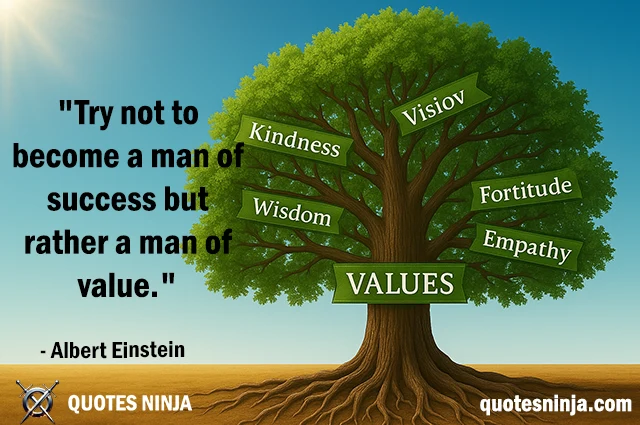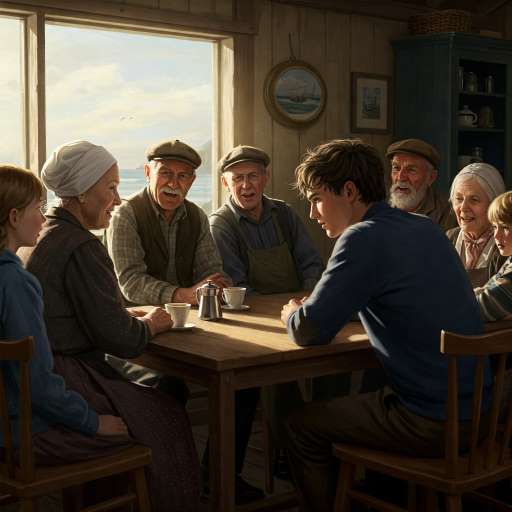
Success Quote: “Try not to become a man of success but rather a man of value.” is attributed to Albert Einstein, was a German-born theoretical physicist.
Deeper Meaning of Success Quote
The quote, emphasizes a shift in priorities from external achievements to internal character.
Here’s what it means:
- “A man of success” typically refers to someone who is focused on status, wealth, fame, or recognition. These are outward signs of achievement.
- “A man of value”, on the other hand, is someone who contributes meaningfully to others and lives by strong principles like integrity, compassion, curiosity, or honesty. Value is about who you are, not just what you have or accomplish.
In essence, Einstein is encouraging people to measure their worth not by how the world views them, but by how much good they bring to others and the world around them. Being valuable often leads to lasting respect and fulfillment, whereas success alone can be hollow if not grounded in purpose.
Here’s a story inspired by Success Quote “Try not to become a man of success but rather a man of value.”
Success Story: “The Lighthouse Keeper“
In a small coastal town nestled between jagged cliffs and wild ocean winds, a young man named Eliot dreamed of becoming someone important. Every evening, he stood outside his modest cottage and stared at the city lights far beyond the sea. He imagined himself in a high-rise office, suited in confidence, shaking hands with powerful people. To Eliot, success looked like applause, promotions, and prestige.
As the only son of the town’s lighthouse keeper, Eliot had grown up surrounded by silence and salt air. His father, Thomas, rarely left the lighthouse, but everyone in the town knew him. He wasn’t rich. He didn’t own much beyond his tools and an old notebook where he scribbled the weather each morning. Still, whenever someone mentioned his name, it was always followed by a quiet nod of respect.

Eliot Leaving His Hometown:
Eliot, however, saw none of that. He saw a man who spent his days alone, tending to rusted gears and dusty lamps.
“I don’t want to end up like him,” Eliot would say to himself. “I want more. I want to matter.”
So, when Eliot turned twenty, he packed a bag and boarded the only bus that left town. He didn’t say goodbye. He left a note that read: “It’s time for me to chase success.”

Eliot in the City:
In the city, Eliot found work in a marketing firm. He wore the suits. He learned the lingo. Quickly, he climbed the ladder by mimicking the people above him. He was sharp, clever, and willing to say anything to close a deal. Promotions followed. Bonuses grew. His apartment rose from the basement to the 15th floor in just three years.
Yet, something tugged at him each night. It was subtle at first—a quiet hollowness as he stared at his reflection in the dark glass of his window. Though he had gained much, he had given little. The world around him felt transactional. Even friendships seemed like contracts wrapped in smiles.
One winter evening, as icy rain tapped against his office window, Eliot received a message: his father had passed away. The lighthouse now stood without a keeper.
The news stunned him. Not because of grief—after all, they hadn’t spoken in years—but because of what the town asked next: Would Eliot return, just for a while, to keep the light burning?
Reluctantly, Eliot returned. The town hadn’t changed much, though it looked smaller than he remembered. The cliffs still loomed like old sentinels, and the wind still smelled like salt and stories.
The lighthouse, however, had aged. The paint peeled. The stairs groaned. Still, the lamp at the top sat patiently, waiting for someone to care for it.

Eliot Listening to Townspeople:
At first, Eliot struggled. The machines made no sense, and the logs his father left were cryptic. But slowly, with each sunrise and each visitor who came to offer stories about his father, something began to shift.
An old fisherman shared how Thomas once rowed through a storm to rescue him. A widow recounted how he repaired her roof without charging a coin. Children spoke of how he read to them when the school closed due to floods.
“Your father didn’t chase success,” one man said, “but he was the kind of man you never forgot.”
Eliot listened. For the first time, he heard his father’s legacy not in words, but in the lives he touched. He had not been rich, but he had been valuable.

Inside the Lighthouse During the Storm:
One night, a violent storm rolled in. The waves crashed higher than Eliot had ever seen. He checked the light—it flickered. The generator sputtered. He scrambled through his father’s old notes and found a line: “In case of failure, reset the coil manually.”
Rain pounded the windows. The wind screamed. Eliot climbed the narrow stairs with a wrench in one hand and fear in the other. The platform shook, but he pushed through. With soaked hands, he followed his father’s scribbled instructions. Sparks flew. The light died—then flared back to life.
Out at sea, a fishing boat horn echoed. The light had found them. Eliot stood there, breathless, heart pounding—not from fear, but from something deeper. Purpose.
Weeks passed. The city called him back, offering a better title and even more money. But Eliot declined.

Eliot on the Lighthouse Balcony at Sunset:
Instead, he restored the lighthouse. He cleaned it, repainted it, and added a bench at the top where people could sit and watch the sea. He began teaching local kids how the light worked. He started a small fund to help aging fishermen. People came, not to see Eliot the successful, but Eliot the helpful.
One evening, as he stood watching the sun dip into the waves, he thought of his old dream. He had become someone important—not in the city, not on magazine covers—but right there, where the sea met the land.
He remembered his father’s silent dedication, and finally understood.
Here is the ending of Success story from the quote “Try not to become a man of success but rather a man of value.”
Moral of the story:
Eliot had chased success and found emptiness. But in seeking value, he had found himself. The lighthouse still stands today, not just as a beacon for ships, but as a reminder that true worth lies not in what you earn, but in what you give.
To explore more on stories and dive into related ideas, be sure to check out the other posts where we cover all sort of stories related to quotes. Stay tuned for more…..
To explore more on quote topics, be sure to check out the other topics where we cover all categories of quotes. Stay tuned for more…..

